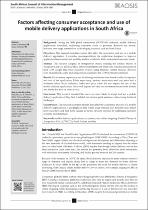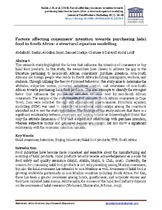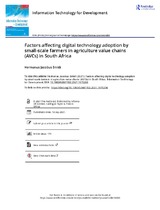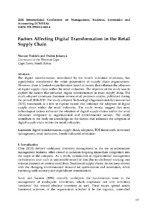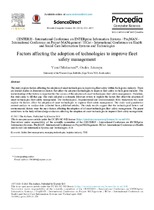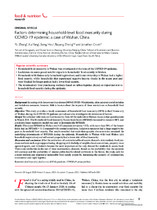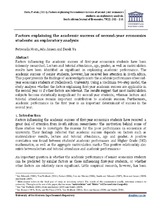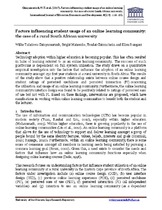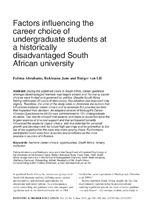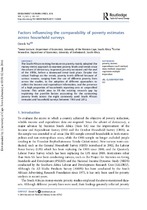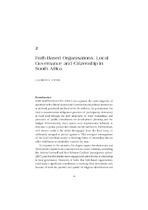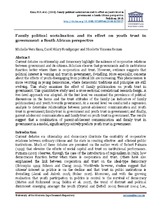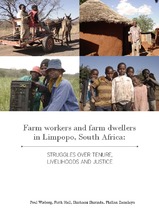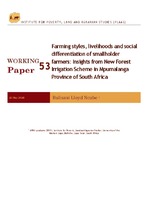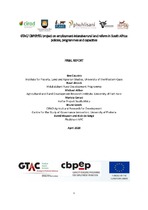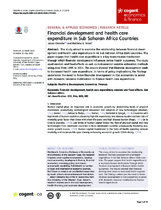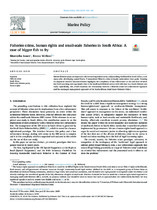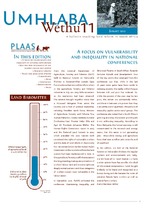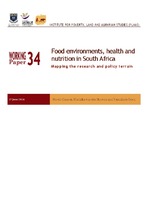Browsing Faculty of Economic and Management Sciences by Title
Now showing items 382-401 of 1122
-
Factors affecting consumer acceptance and use of mobile delivery applications in South Africa
(AOSIS, 2023)During the 2020 global coronavirus (COVID-19) outbreak, mobile delivery applications flourished, facilitating consumer access to groceries. Research has shown, however, that usage remains low in developing countries such ... -
Factors affecting consumers’ intention towards purchasing halal food in South Africa: a structural equation modelling
(Routledge, 2018)This research study highlighted the factors that influence the intention of consumers to buy halal food products. In this study, the researchers have chosen to address the gap in the literature pertaining to non-South ... -
Factors affecting digital technology adoption by small-scale farmers in agriculture value chains (AVCs) in South Africa
(Routledge, 2021)Digital technologies enable small-scale farmers to reduce some constraints to participate in Agriculture Value Chains (AVCs). Small-scale farmers face significant challenges and barriers to adopting digital technology. ... -
Factors Affecting Digital Transformation in the Retail Supply Chain
(2021-06)The digital transformation, introduced by the fourth industrial revolution, has significantly transformed the value proposition of supply chain organisations. However, there is limited extant ... -
Factors affecting the adoption of technologies to improve fleet safety management
(Elsevier, 2021)are limited studies in literature on factors that affect the adoption technologies to improve fleet safety in the logistic industry. The understanding of the factors is important for the success of the adoption of smart ... -
Factors determining household-level food insecurity during COVID-19 epidemic: A case of Wuhan, China
(Swedish Nutrition Foundation, 2021): In coping with the coronavirus disease 2019 (COVID-19) epidemic, cities adopted social isolation and lockdown measures; however, little is known about the impacts of these restrictions on household food security.This ... -
Factors explaining the academic success of second-year economics students: an exploratory analysis
(Blackwell Publishing Ltd, 2011)Factors influencing the academic success of first-year economics students have been intensely researched. Lecture and tutorial attendance, age, gender, as well as matriculation results have been identified as significant ... -
Factors influencing student usage of an online learning community: the case of a rural South African university
(Inderscience, 2017)Technology adoption within higher education is becoming popular. This has often resulted in hubs of learning referred to as an online learning community. The success of such platforms is dependent on full system utilisation. ... -
Factors influencing the career choice of undergraduate students at a historically disadvantaged South African university
(IP Publishing, 2015)During the apartheid years in South Africa, career guidance amongst disadvantaged learners was largely absent and, for many, career choices were limited and governed by politics. Despite South Africa having celebrated ... -
Factors influencing the comparability of poverty estimates across household surveys
(Taylor & Francis group, 2016)The South African existing literature on poverty mainly adopted the money-metric approach to examine poverty levels and trends since the advent of democracy. In general, poverty increased until the end of the 1990s, ... -
Faith-based organisations, local governance and citizenship in South Africa
(University of KwaZulu-Natal Press, 2009) -
Family political socialisation and its effect on youth trust in government: a South African perspective
(Taylor & Francis, 2018)Current debates on citizenship and democracy highlight the salience of cooperative relations between government and its citizens. Scholars observe that governments and its institutions function better where there is ... -
Farm workers and farm dwellers in Limpopo, South Africa: Struggles over tenure, livelihoods and justice
(Institute for Poverty Land and Agrarian Studies (PLAAS), 2013)Stories about farm workers and dwellers losing their homes, land and livelihoods are common in contemporary South Africa, and also in Limpopo Province. Around 1988, Grace M.1 and her children were evicted from a Limpopo ... -
Farming styles, livelihoods and social differentiation of smallholder farmers: Insights from New Forest Irrigation Scheme in Mpumalanga Province of South Africa
(Institute for Poverty, Land and Agrarian Studies, University of the Western Cape, 2018-05)This article focuses on the socio-economic differentiation of smallholder farmers in New Forest Irrigation Scheme. Smallholder irrigation schemes are seen as a way of alleviating poverty and contributing to economic growth. ... -
Final Report
(GTAC, 2020-03-31)This study focuses on the potential contribution of redistributive land reform to employment creation. Can land redistribution be undertaken in a manner that also creates jobs, and if so, through which types of land use ... -
Financial development and health care expenditure in Sub Saharan Africa Countries
(Taylor & Francis, 2020)The study aimed to examine the relationship between financial development and health care expenditure in 46 Sub Saharan Africa (SSA) countries. The paper argues that health care expenditure is a key transmission mechanism ... -
Fisheries crime, human rights and small-scalefisheries in South Africa: Acase of biggerfish to fry
(Elsevier, 2019)Marinefisheries plays an important role in ensuring food security and providing livelihoods in South Africa, as inmany other developing coastal States. Transnationalfisheries crime seriously undermines these goals. Drawingon ... -
A focus on vulnerability and inequality in national conferences
(PLAAS, 2011-01)Since the national Department of Agriculture, Forestry and Fisheries (DAFF) held its National Summit on Vulnerable Workers in Somerset-West outside Cape Town to discuss better conditions for workers in the agriculture, ... -
Food environments, health and nutrition in South Africa: Mapping the research and policy terrain
(Institute for Poverty, Land and Agrarian Studies, University of the Western Cape, 2016-06)The aim of this paper was to review existing research and policies related to food environments so as to identify research gaps towards a research agenda for the new Centre of Excellence in Food Security. Food environments ... -
Food security, equitable development and South–South migration: Towards a research agenda
(Wiley [Commercial Publisher], 2023)In this commentary, we reflect on recent policy-related and research moves to connect migration with food security. Food security refers to the condition where individuals, households, and communities have both physical ...

